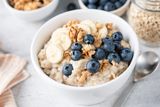The case for raw milk - 'I drink it every morning with my breakfast'
Irresponsible health risk or nutritious superfood? Advocates claim it contains more calcium and improves eczema and asthma, among other benefits. Critics says it's a hazard that leaves us open to highly dangerous disease-causing bacteria. Ailin Quinlan looks at the arguments for and against unpasteurised milk.
Raw milk is said to strengthen the immune system
Young farmer Owen Crawford and his partner Mimi, have been producing - and drinking - unpasteurised milk for several years.
The couple, who live on their farm near the eco-village of Cloughjordan, Co Tipperary - many of the residents are customers of theirs - produce raw milk from their herd of pure-bred Irish shorthorns.
They supply a number of customers through both a community farm and their door-to-door service with the product, which, says Owen, undergoes regular and stringent testing.
"We drink it ourselves and make cheese out of it. I drink it every morning with my breakfast," says Owen (27), who was a dry-stock farmer until he switched over to the production of raw milk.
"Raw milk is nicer, it's so much creamier than pasteurised milk, and it's almost sweet to the taste."
He is a believer in the health benefits of unpasteurised milk. "There are good bacteria in raw milk which are good for the immune system, and which are killed during the pasteurising process. Raw milk is easier to digest. There is a lot of research out there in support of it.
It's a good product.
"We've been producing it for about five or six years - we run our own 30-acre dairy farm, and have a herd of pure-bred Irish shorthorns who produce raw milk.
"We switched to the production of raw milk five or six years ago because of the demand for it locally. Our customers are very conscious about what they eat and were it comes from. We test twice a year for TB, Brucellosis, Leptospirosis and we also send milk samples every two months for testing for bacterial such as e-coli and salmonella."
For more information, see crawfordsfarm.ie.
The Queen of England drinks it - and, when her grandsons Harry and William were students at Eton College, she reportedly went out of her way to get it sent to them.
Well-known author, chef and doyenne of the renowned Ballymaloe Cookery School, Darina Allen drinks it too - and so does her family, including children and grandchildren.
In fact the well-known East Cork family - who have long been linked to the production of good food - are so enthusiastic about raw milk, they keep a small herd of cattle to produce their own supply.
Raw, or unpasteurised milk, it seems, is the Marmite of the dairy sector - people are either for it or against it, but whichever side they're on, they're passionate.
Allen was at the forefront of the successful Raw Milk Campaign, which lobbied strongly - and successfully - a few years ago to stop the government from completely banning the product.
In January 2013 the government said it would instead introduce regulations governing its production and sale.
Allen says she believes in the public's freedom of choice to avail of hygienically produced, healthy unpasteurised milk.
Raw milk can be of benefit to people with asthma, she believes, adding that it contains good vitamins and minerals which are lost in the pasteurisation process.
Supporters of raw milk point to research which, they say, shows it helps the body produce an important anti-oxidant, glutathione, allows it to utilise calcium more efficiently and bring about a significant reduction in asthma and allergies.
On the other hand, the Food Safety Authority of Ireland - currently carrying out an in-depth study of the product to determine the levels of harmful bacteria contained in it - recommends that the product should be banned, because it believes around 10pc of raw milk contains dangerous pathogens. Milk is a very vulnerable product, and can be very easily contaminated, Allen acknowledges: "I wouldn't drink raw milk from every farmer. You must get it from a farm which is very well-run with a high standard of hygiene and where the cows are grass-fed and very well nourished."
The Allens drink it themselves and also sell their own raw milk in the Ballymaloe Food Shop, where customers, says Allen, come from up to 60 miles away to buy it.
"Our children and grandchildren drink raw milk, the whole family drinks it and people come from all over to buy it."
Why?
Well, she says it tastes better for a start, and there are other benefits.
"People lived on raw milk for a long time. Anyone will tell you that the calcium in milk is less accessible to the body when the milk has been pasteurised," Allen explains. Customers have reported a number of health benefits from drinking unpasteurised milk, she says. "We have people whose children have asthma or eczema who report that they find enormous improvements in the child's condition, and sometimes cure it completely," she reports.
"There is real paranoia around raw milk," she declares, adding that there's concern that any problems in the relatively small raw milk market could impact on the whole Irish milk sector.
"However there is a real increasing demand for it all over the world now that people realise the benefits. We are asking the government not to impose an outright ban on it but to have the production of raw milk regulated."
The current lack of regulation is dangerous, warns Elizabeth Ryan, wholesale manager for Sheridan's Cheese Mongers, which sold raw milk for some years and will soon be stocking it again. Ryan says the current situation, where regulations have yet to be published by the government, has left the market open to abuse.
"Because the government has not introduced regulations, it is putting the public in danger. At the moment anyone can bottle and sell raw milk - we want a set of regulations so that only smaller farmers who are engaging in careful practises and farmers who are willing to label their milk correctly with appropriate health warnings are allowed to sell raw milk."
In a statement, the Department of Agriculture, Food and the Marine said it was "currently assessing the options available to it to counter the risks associated with the sale of unpasteurised milk for direct human consumption.
"Unpasteurised milk can contain disease-causing bacteria including E.Coli O157, Campylobacter, Tuberculosis, Salmonellosis and Brucellosis.
"A particular option which is being considered at present in the context of a review of the relevant secondary legislation is the introduction of specified regulatory standards to apply to the sale of raw milk."
Sheridan's decided to sell raw milk back in 2010 after a trusted supplier decided to produce it, says Ryan. They found an instant market.
"There was an immediate demand for it among our customers. We had a hugely diverse range of people coming for it, from bodybuilders to mothers who felt it was beneficial, to people who simply liked it because it was a natural product - and everyone said it tasted better!"
People have many reasons for wanting to drink it, she says, from perceived health benefits to taste. Some are attracted by the fact that it is a natural, unprocessed product, she says, while others grew up drinking it and enjoy the taste.
When their supplier sadly passed away over 18 months ago, Sheridan's stopped selling raw milk - but the group is currently planning to put it on sale once again.
"We are currently talking to a farmer with a view to stocking it once again. It's very important to us to be comfortable with the supply chain and the supplier. We plan to have it back on the shelves over the next few months."
However, according to Dr Lisa O'Connor, chief specialist in food science at FSAI, the product should be banned. O'Connor warns that while the benefits of drinking it have not been scientifically proven the risks have - and they are serious.
"During milking, even when good hygiene practises are in use, the milk can become contaminated with these pathogens or harmful bacteria," she says, adding that scientists are particularly concerned about a harmful e-coli which produces a toxin that in a proportion of cases can damage the kidneys, particularly those of young children and in some cases can lead to kidney failure.
Other bacteria that can be found in raw milk such as Listeria monocytogenes can pose a serious health risk for pregnant women, she warns: "Pregnant women might be familiar with Listeria, given the advice to pregnant women not to consume foods like soft cheeses, and this is the case for raw milk also," O'Connor says, pointing out that raw milk was banned in Scotland in 1986 after 29 outbreaks of salmonella food poisoning over a 10-year period between 1970 and 1979, affecting more than 2,400 people who had consumed raw milk.
In 2004, Scotland's existing ban on raw cow's drinking milk and raw cream was extended to all species.
While it is legally permitted to sell raw milk in Ireland, says O'Connor, people who are in vulnerable groups - the elderly, under-fives and pregnant women, should not consume raw milk.
"I would be concerned about giving it to young children - the reported benefits have not yet been proven," she said, adding that the FSAI has conducted a study of raw milk to establish the level of harmful bacteria. The results of this work will be published before the end of the year.
She points to a case in which raw milk was linked to food poisoning - an outbreak of Salmonella Typhimurium definitive type (DT) 104 which occurred in a dairy farming family in Leinster in 2010.
"The FSAI scientific advice is that farm families should pasteurise their own milk and the advice we have given to the Department of Health is that the sale of raw milk should be banned," says O'Connor.
"Raw milk was banned in Ireland until 2006, when, due to changes in EU legislation that ban was lifted. We would like to see that ban reinstated under national law. We know there are low levels of pathogens in raw milk and the way to make milk safe is to pasteurise it."
Join the Irish Independent WhatsApp channel
Stay up to date with all the latest news














